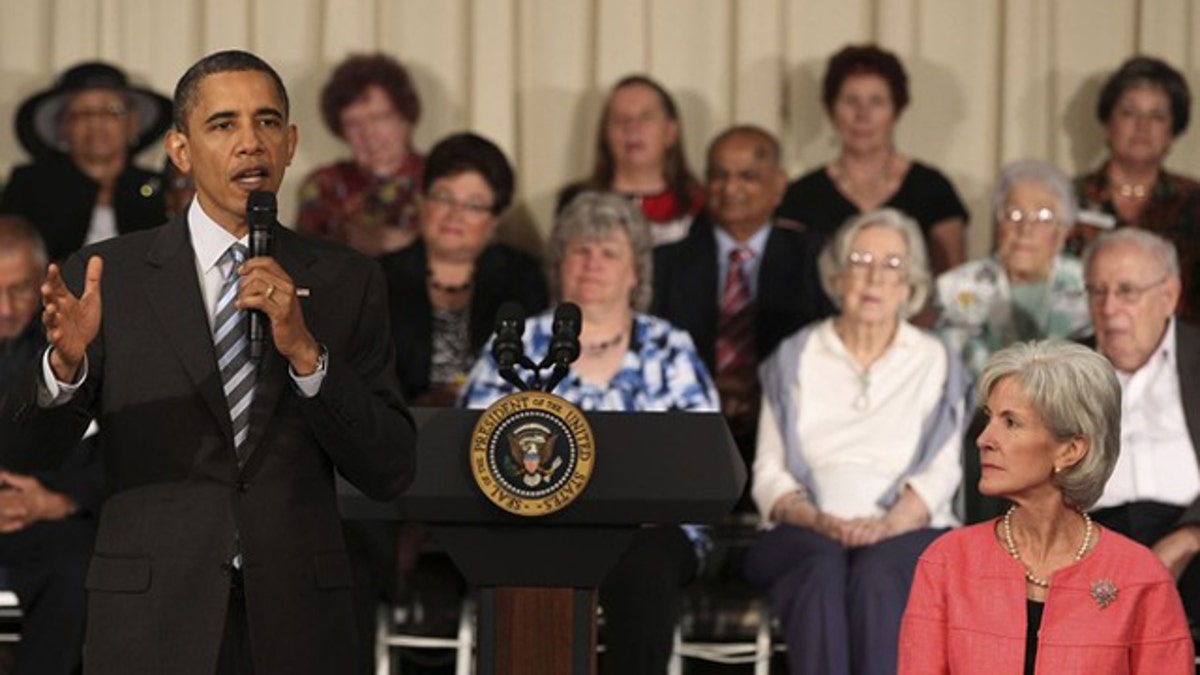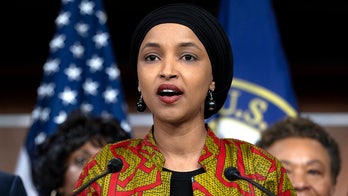
President Obama speaks next to Health and Human Services (HHS) Secretary Kathleen Sebelius (R) as he holds a town hall meeting at the Holiday Park Multipurpose Senior Center, June 8, 2010. (Reuters)
President Obama and Democrats have proposed a $250 rebate to seniors who are not getting a cost-of-living increase in their Social Security benefits for the second year in a row, but critics are suggesting the promised pay-out is merely intended to sway the senior vote -- and likely won't even succeed in that, with the midterm election two weeks away.
Polls suggest the Social Security work-around won't have much political impact on seniors who are poised to turn out in record levels on Nov. 2 and are likely to pull the lever for the Republican candidate -- an advantage that could propel the GOP into power in the House and possibly the Senate.
The proposal comes as more than 200 Democratic candidates urge Obama to reject any proposed cuts to Social Security benefits from his fiscal commission, which has said everything, including entitlements, are on the table.
Critics dismiss the efforts as a cheap stunt.
"I think the Democratic Party's standing between now and November is past the point of rescue with seniors," Glen Bolger, a GOP pollster, told FoxNews.com.
But Democratic pollster Mark Mellman said the proposal can't hurt.
"It's hard to say that any policy makes the difference," he said. "But it does underline differences between Republicans and Democrats on Social Security and Social Security can make a real difference in seniors' voting decisions."
Democratic pollster Guy Molyneux said seniors will have a "positive reaction" to candidates who support the proposal.
"Whether it will move their votes, I really don't know," he said.
Obama's 18-member bipartisan deficit commission is expected to unveil a set of proposals for cutting the deficit in December. The two leaders of the panel have warned that Social Security is careening toward bankruptcy and have indicated that every option is on the table. That could mean proposals to cut future benefits or increase payroll taxes.
Several Republican candidates on the campaign trail have warned that workers under age 55 should prepare to face changes in the way Social Security calculates retirement.
But more than 200 Democrats, including 81 House candidates, 11 Senate candidates and 133 congressional incumbents, have signed a petition circulated by the Progressive Change Campaign Committee to protect the status quo of the program.
"Social Security is a promise that must not be broken," the pledge reads in part. "We need to strengthen Social Security, not cut it."
Members of the Congressional Progressive Caucus also wrote to Obama last month opposing any cuts to Social Security benefits, including raising the retirement age.
The group argued that the program is on track to accumulate a $4.3 trillion surplus and can pay full benefits until 2037 and at least 75 percent of all benefits after that. The group also noted that the program has not contributed to the federal deficit because it is funded separately from the general treasury and has no borrowing authority.
"If any of the commission's recommendations cut or diminish Social Security in any way, we will stand firmly against them," the group wrote. "We urge you to join us in protecting and strengthening Social Security rather than letting it fall victim to a misguided attempt to reduce budget deficits on the backs of working families."
Social Security is supported by a 6.2 percent payroll tax -- paid by both workers and employers -- on wages up to $106,800.
The Social Security Administration announced this month that seniors would not get an increase for the second consecutive year because of low inflation, prompting Obama to call for the $250 rebate for seniors.
Congress will vote on the rebate during the lame duck session after the Nov. 2 election, Democratic leaders have pledged. But that's unlikely to influence seniors going to the polls, Bolger said.
"Look, the problems they have with seniors goes far beyond no COLA," Bolger said, noting that more seniors voted for Arizona Sen. John McCain in the presidential election two years ago and aren't happy with one party controlling Washington.
Seniors preferred Republicans by a 52 to 40 percent margin, according to Gallup polls taken during throughout the summer.
A Rasmussen Reports national survey released this week showed seniors preferred Republicans by a 56-34 percent margin.
Bolger's data show that seniors favor Republicans by an average 3 percentage points in the top 86 congressional seats held by Democrats. While that's not a large margin, Bolger noted that "seniors are the most consistent voters in non-presidential elections."
"We're seeing the turnout is going to skew older and seniors will be a disproportionate share of the vote," he said.
Mellman, the Democratic pollster didn't dispute Bolger's data. He said it shows seniors are a "contested group."
"I think Democrats are sending a message to seniors that we're going to focus on their needs and concerns," he said. "And in an environment where some Republicans want to dismantle Social Security, going the extra mile to see that seniors get a cost-of-living increase is an important signal."




